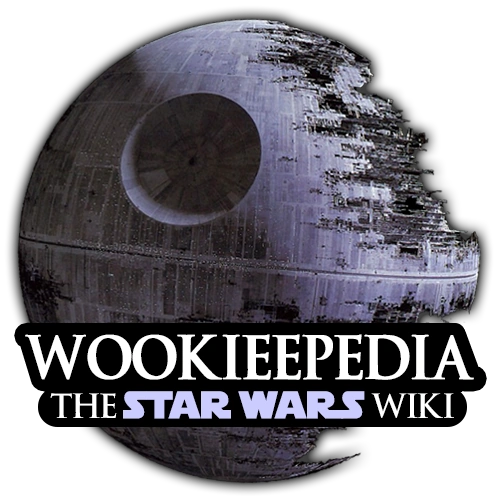| | |
Warning: This infobox has missing parameters: subgroup and unrecognized parameters: members, era
- "Battle platforms can destroy, starfleets can blockade, but only the army can take and hold the ground. Without the ground, all your fancy spaceships will wither and rot."
- ―General Crix Madine
The Alliance Army was a military branch containing the ground forces of the Alliance Military, consisting of the Alliance Special Forces controlled by Alliance High Command, and various Sector Forces controlled by a Sector Commander. It was later replaced by the New Republic Army.
The Alliance Army was founded and operated until the Battle of Endor as a guerrilla force aimed at tying down and harassing an enemy force rather than meeting that enemy in open battle. An Alliance Army force could expect to be outnumbered in any given battle it fought against the Imperial Army, and as such its tactics were geared towards 'hit and run' rather than a conventional battle.
History
The Alliance Army was formed after the establishment of the Alliance to Restore the Republic in 2 BBY.[2] It was the ground forces of the Alliance Military, consisting of the Alliance Special Forces controlled by Alliance High Command, and various Sector Forces controlled by a Sector Commander. It was formed from some of the early resistance groups to fight against the Empire. The Alliance Army was far from being as large as it's main opponent, the Imperial Army.
Following the failure of Operation Domino, the Army was supplanted by the Alliance Starfighter Corps as the primary Rebel fighting force.[6]
The Battle of Hoth was one of the few ground engagements in which the Alliance Army fought in numbers and used conventional defense tactics, and in most of its battles operated as guerrilla raiding force, harassing and tying up Imperial forces.
The Alliance Army combated Imperial Army's AT-ATs during the Battle of Hoth. Alliance troops found their light weaponry relatively useless against the heavily armored Imperial vehicles. The most effective weapon they used to combat the Imperial walkers were arguably the T-47. The Alliance Army's role during the Battle of Endor was mostly a commando operation, in which a small strike team was deployed to destroy the energy shield generator protecting the Second Death Star.
The Alliance Army was operated until the Battle of Endor in 4 ABY and was later replaced by the New Republic Army.[3]
Soldiers
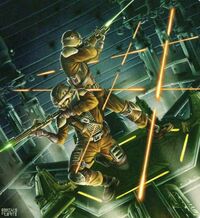
Rebel Alliance soldiers in training session
The Alliance Army's infantry was formed partly of the Alliance Special Forces, Sector Forces, and SpecOps divisions. Organizations formed of highly trained commandos and agents, who performed a series of guerrilla attacks throughout the Galactic Civil War with the aim of undermining, pilfering from and ultimately destroying the Empire. The rest of the Alliance Army's infantry was made up of Sector Forces with the vast majority of the personnel being Rebel troopers.
Command structure
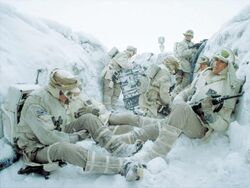
Alliance Army personnel preparing for the Imperial assault at the Battle of Hoth.
The Rebel Alliance Army and Sector Force had a largely standardized command structure. While it could vary from sector to sector, most Sector Forces used the following organization:[7]
- Corporal: Second-in-command in a squad of nine troops. The corporal was the senior-most trooper.[7]
- Sergeant: Commanded a squad of 9 troopers.[7]
- Lieutenant: Commanded a platoon that consisted of 4 squads (36 troops).[7]
- Captain: Commanded a company that was made up of 4 platoons (144 troops) .[7]
- Major: Commanded a battalion composed of 4 companies (576 troops).[7]
- Colonel: Commanded a regiment that was made up of 4 battalions (2,304 troops). Occasionally commanded brigades which was composed of 4 regiments (9,216 troops). The colonel was occasionally referred to as a regimental commander.[7]
- General: Commanded brigades which consisted of 4 regiments (9,216 troops) or corps which was formed by 4 brigades (36,864 troops). A sector's most senior general could also command a Sector Army.[7]
Above the generals were the senior generals who usually held the title of Sector Force commander, followed by the Sector Force Supreme Commander (Alliance/Republic).[7]
In the Navy, the rank of Petty officer, Chief Petty Officer, Ensign, Lieutenant, Lieutenant Commander, Commander, and Captain were the ranks beneath the rank of Admiral (with Admiral of the Fleet as the Supreme Commander (Alliance/Republic) of the combined Alliance Fleet). Beneath the officers were the ordinary crewmen, generally referred to as Deckmen.[7]
Equipment
When in major battles the Alliance was known to utilize several different vehicles and military equipment. Some of them were from the Clone Wars era.
Armor
- AAC-1 speeder tank
- AAC-2 hovertank
- All Terrain Tactical Enforcer
- All Terrain Attack Pod
- All Terrain Experimental Transport
- Energy Pummel (Rebel Alliance)
- HAVw A5 Juggernaut
- HAVw A6 Juggernaut
- Heavy Tracker
- Mobile Defense Unit
- Rebel Armored Freerunner
- Rebel attack tank
- Rebel combat speeder
- T1-B hovertank
- T2-B repulsor tank
- T3-B heavy attack tank
- T4-B heavy tank
- TX-130 Saber-class fighter tank
- Ultra-Light Assault Vehicle
Artillery
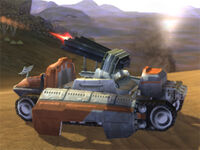
A MPTL-2a artillery unit firing.
- 1.4 FD P-Tower
- Artillery (Rebel Alliance)
- Blaster Cannon
- DF.9
- FPC 6.7 Anti-Aircraft Battery
- M102 Fire Arc
- MLC-3 Mobile Laser Cannon
- MobileMortar-3
- Mobile Proton Torpedo Launcher
- Mobile Proton Torpedo Launcher-2a
- SP.9 Anti-Infantry Artillery Vehicle
- V-188 Penetrator
Mechanized Infantry
- Armed transport
- Armored hover train
- A-A5 speeder truck
- Arrow-23 transport landspeeder
- Endor Forest Ranger
- HTT-26 heavy troop transport
- Infantry Support Platform
- PDT-8 Personnel Deployment Transport
- Personnel Skiff Model IV
Aerial Assault
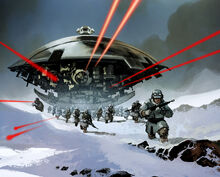
Rebel Alliance soldiers escorting a GR-75 medium transport during the Battle of Hoth
- AHS-1 heavy assault airspeeder
- GR-75 medium transport
- Hover Transport TC9
- Light Corvette (air cruiser)
- T-47 airspeeder
- Tachyon fast-attack airspeeder
Reconnaissance
- 74-Z speeder bike
- Air bike
- All Terrain Personal Transport
- All Terrain Recon Transport
- Flare-S swoop
- Rebel scout speeder
- Security Scout Vehicle
Planetary Defenses
- v-150 anti-orbital ion cannon
- LNR Series I Systemary Laser Battery
- LNR Series II Systemary Laser Battery
- GenCore Level I
- GenCore Level II
Infantry
- Rebel trooper
- Rebel commando
- Rebel marksman
- Rebel mortar trooper
- Rebel pilot
- Rebel marine
- Rebel dark trooper hunter
- Rebel gunner
- Rebel Honor Guard
- Rebel vanguard division
- Rebel Desert Trooper
- Rebel Assault Trooper
- Rebel Heavy Trooper
- Rebel Prison Trooper
- Rebel Missile Trooper
- Rebel Infiltrator
- Alliance Elite Guard
- Sith Hunter
- Sea Commando
- Rebel privateer
Tactics
Compared to the forces of the Imperial Military, the Alliance's ground forces were woefully outmatched in numbers of troops, vehicles, warships and material.[8] Because of this, Alliance commanders were taught to follow Madine's Rules of War. Striking the enemy at his weakest points, destroying their morale and outsmarting enemy commanders were seen as the best way for the Rebels to achieve victory during offensive operations.[8]
The same principle was applied to defensive operations. Army units were often tasked to provide cover while important Rebel assets escaped and other temporary holding actions; extended defensive battles would always result in the Imperial Army eventually overwhelming them with superior numbers.[8] A form of mobile defense was encouraged, whereby ground was given up when necessary in order to lure overextended Imperial forces into a trap. The Battle of Tiems was a classic example of this method and later used as an lesson to teach new Army commanders.[8]
Tactically the Alliance Army fought as a combined arms force, utilizing infantry, artillery, armor (Combat Assault Vehicles or CAVs), scout units, ground transports (Light Mechanical Vehicles or LMVs), and air support (Sub-Atmospheric Craft or SAC). Because of shortages within the Rebellion, however, not all of these elements were always present on a battlefield.[8] Reflecting the Alliance Army's way of fighting, most Rebel vehicles tended to be lighter and faster than their Imperial counterparts in order to outmaneuver them and either attack weak points or retreat in the face of overwhelming firepower.[8]
Troopers on board the Tantive IV were seen using a two-man buddy system for point and cover fire as a standard tactic.[9]
Behind the scenes
The Alliance Army appeared in the first of the Star Wars media, the novelization of Star Wars: Episode IV A New Hope.
The Alliance Army featured in the Leia Organa campaign in the 2001 video game Star Wars: Galactic Battlegrounds.
Appearances
- Star Wars: Galactic Battlegrounds
- Star Wars: Battlefront
- Star Wars: Battlefront II
- Star Wars: Empire at War
- Star Wars: The Force Unleashed II
- Star Wars: Force Commander
- Star Wars Episode IV: A New Hope novelization (First appearance)
- Star Wars: Episode IV A New Hope
- Super Star Wars
- Star Wars: Empire at War: Forces of Corruption
- Star Wars: Rebellion
- X-Wing: Rogue Squadron
 "The Evacuation of Jatee" — Supernova
"The Evacuation of Jatee" — Supernova- Star Wars: Episode V The Empire Strikes Back
- Star Wars: Episode VI Return of the Jedi
- Star Wars Episode VI: Return of the Jedi novel
- Star Wars Episode VI: Return of the Jedi junior novel
- Gathering Shadows (Mentioned only)
Sources
- Star Wars: The Empire Strikes Back toy line
- Star Wars: Return of the Jedi toy line
- Rebel Alliance Sourcebook
- The Movie Trilogy Sourcebook
- Rebel Alliance Sourcebook, Second Edition
- Star Wars: The Power of the Force (1995)
- Star Wars: Power of the Jedi
- Star Wars: Rebellion: Prima's Official Strategy Guide
- Star Wars: Galactic Battlegrounds
- Visual Guides
 Star Wars Trading Card Game — The Empire Strikes Back (Card: Rebel Trench Defenders) (backup link (http://www.wizards.com/swtcg/images/esb/rebel_trench_defenders.jpg) not verified!)
Star Wars Trading Card Game — The Empire Strikes Back (Card: Rebel Trench Defenders) (backup link (http://www.wizards.com/swtcg/images/esb/rebel_trench_defenders.jpg) not verified!) Star Wars Galaxies Trading Card Game — Squadrons Over Corellia (Card: Rebel Army Captain) (backup link)
Star Wars Galaxies Trading Card Game — Squadrons Over Corellia (Card: Rebel Army Captain) (backup link) Star Wars Galaxies Trading Card Game — Squadrons Over Corellia (Card: Rebel Grenadier) (backup link)
Star Wars Galaxies Trading Card Game — Squadrons Over Corellia (Card: Rebel Grenadier) (backup link) Star Wars Galaxies Trading Card Game — Squadrons Over Corellia (Card: Rebel Guardsman) (backup link)
Star Wars Galaxies Trading Card Game — Squadrons Over Corellia (Card: Rebel Guardsman) (backup link) Star Wars Galaxies Trading Card Game — Squadrons Over Corellia (Card: Rebel Heavy Trooper) (backup link)
Star Wars Galaxies Trading Card Game — Squadrons Over Corellia (Card: Rebel Heavy Trooper) (backup link)- Rebellion Era Campaign Guide
- Galaxy at War
- Star Wars: Edge of the Empire Core Rulebook
- Forged in Battle
Notes and references
- ↑ Star Wars: The Force Unleashed (video game)
- ↑ 2.0 2.1 The Force Unleashed novel
- ↑ 3.0 3.1 The Essential Guide to Warfare
- ↑ 4.0 4.1 Star Wars: Episode IV A New Hope
- ↑ Star Wars: Episode V The Empire Strikes Back
- ↑ 6.0 6.1 The Essential Guide to Warfare
- ↑ 7.0 7.1 7.2 7.3 7.4 7.5 7.6 7.7 7.8 7.9 Rebellion Era Campaign Guide
- ↑ 8.0 8.1 8.2 8.3 8.4 8.5 Rebel Alliance Sourcebook
- ↑ Visual Guide Chapter 3
